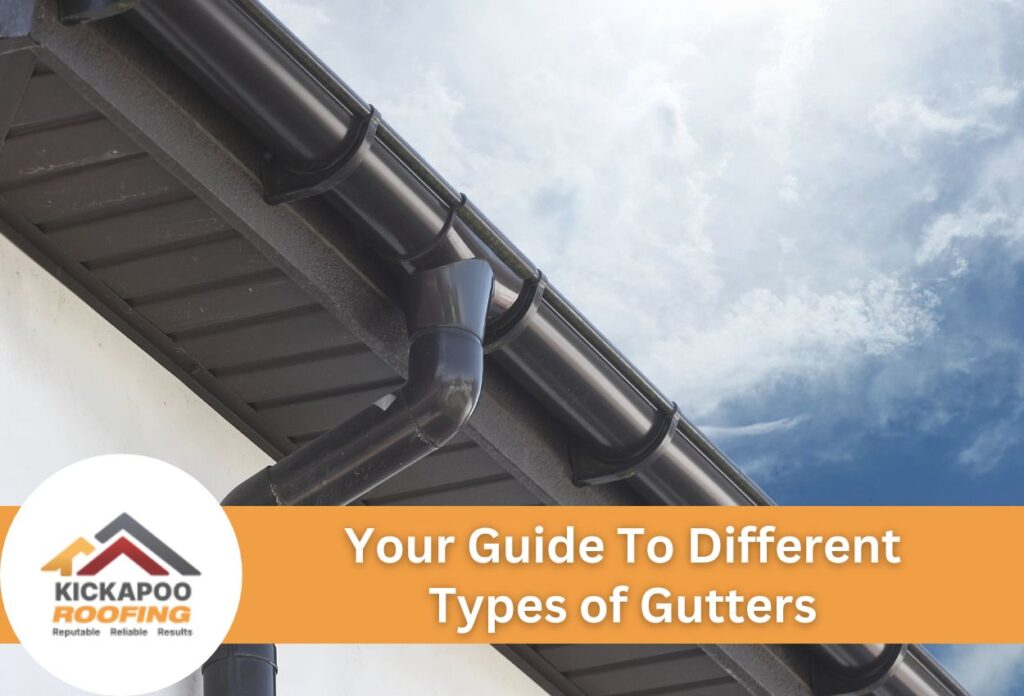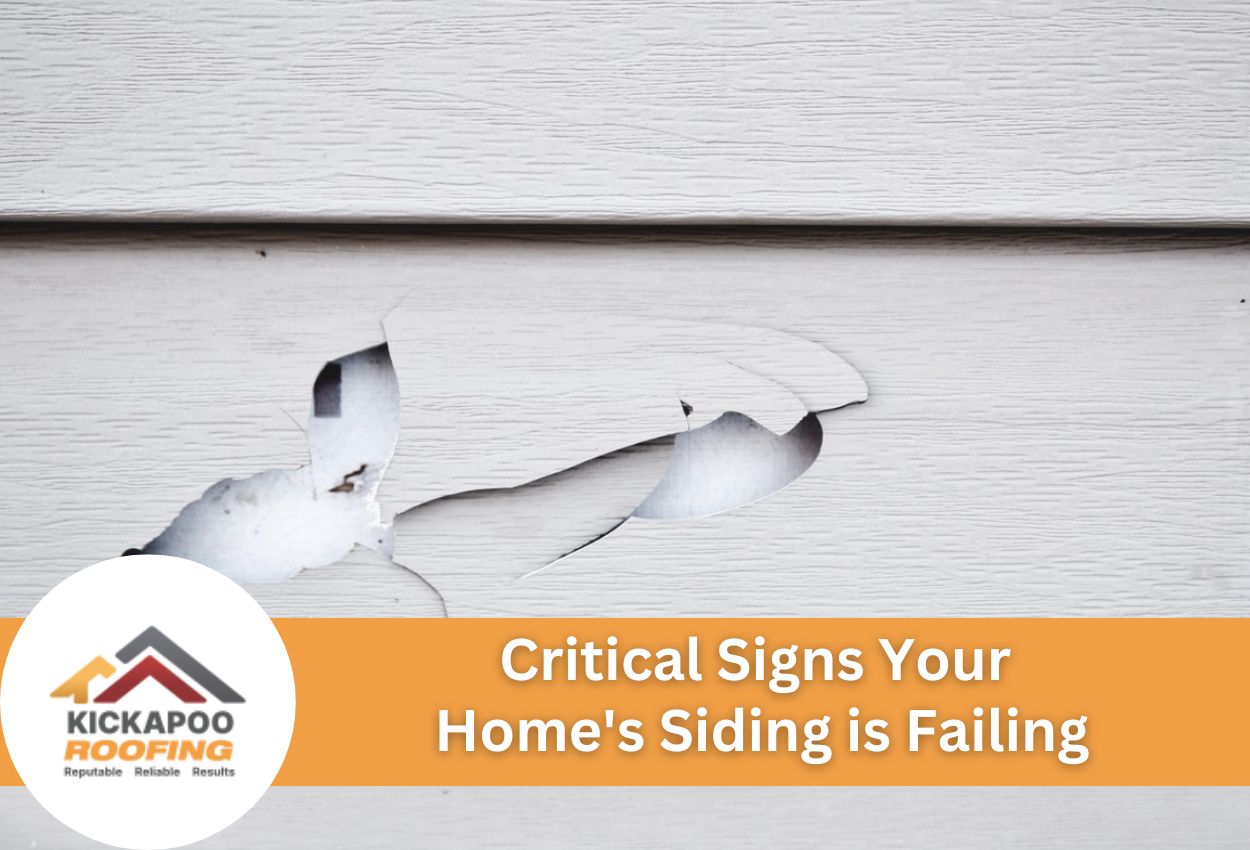Are you exploring different types of gutters for your home? While selecting a type of gutter for your house may seem a simple task, it requires careful consideration. Your home is a blend of aesthetics and functionality, and a single bad decision can comprise both. Therefore, you need to be selective when exploring different types of gutters and consider multiple factors that can impact their effectiveness. This will help you make the right choice for your specific needs.
The selection of a gutter type and style heavily depends on their capacity to hold and drain water coming from your roof. It also depends on the type of roof you have installed. If you have a sloped or a high-pitched roof, you will need to choose gutters that can manage the heavy amount of water running down the roof.
This blog post aims to educate you on different gutter types, styles, and materials to help you choose a one that suits your home’s design and functionality. Stick to this blog post until the end to make an educated decision.
Different Types of Gutters: Sectional and Seamless Gutters
Apart from the gutter styles and materials, one crucial factor to consider is different types of gutters: seamless and sectional.
1. Sectional Gutters
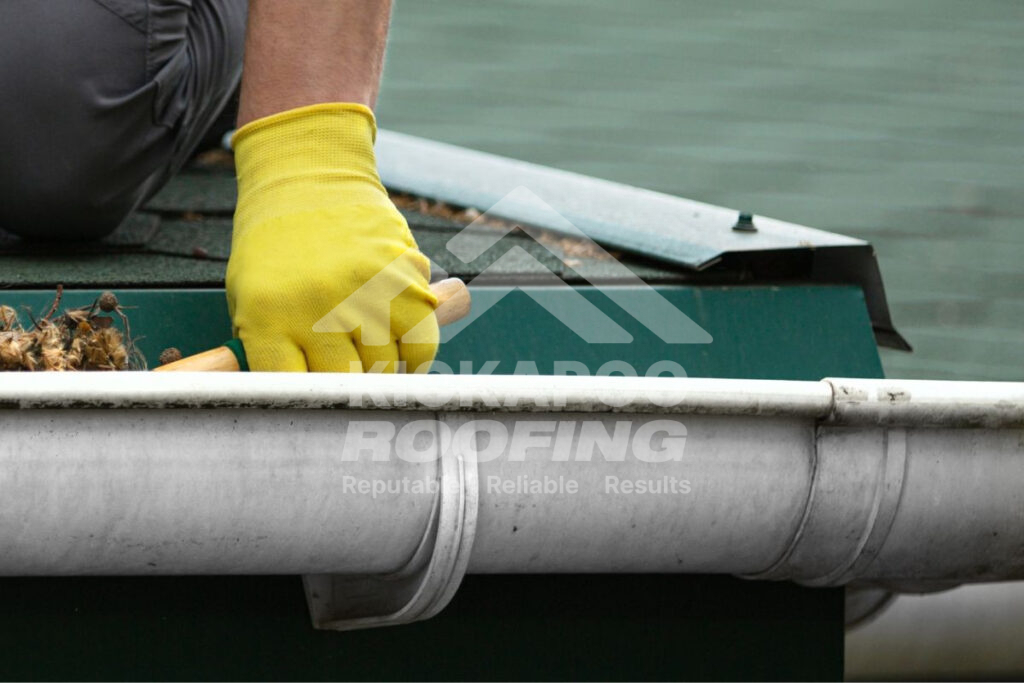
Sectional gutters, also referred to as traditional gutters or just gutters, consist of smaller components joined and sealed together during installation. Here are some of their specific features:
- Ease of Installation: The prime advantage of opting for seamed gutters lies in their easy installation process. Some homeowners can DIY the installation with just basic tools.
- Price: Another key upside to sectional gutters is that they are generally less expensive than their seamless counterparts.
- Versatility: In addition to being budget-friendly, sectional gutters offer a vast range of color options to suit your home’s aesthetic appeal perfectly.
However, it’s worth mentioning that the seams in these gutters may potentially lead to leaks over time if not properly maintained, which is one reason why seamless alternatives are becoming more popular.
2. Seamless Gutters
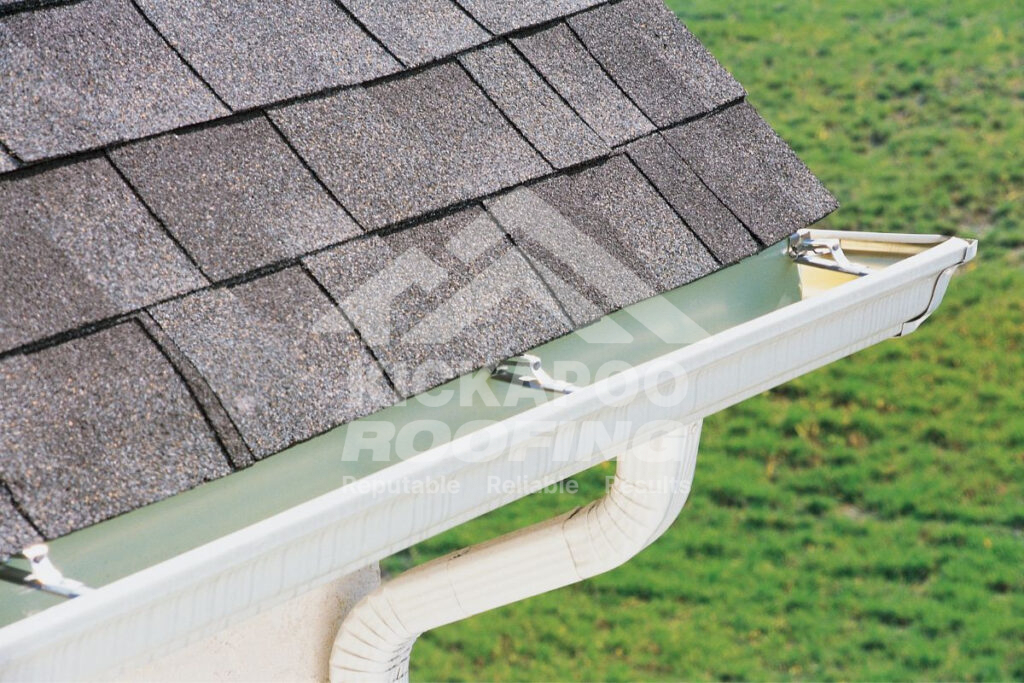
Seamless gutters are formed from one continuous piece of material, eliminating joints except at corners and downspouts. Here are some of their features:
- Custom-Made: This type of gutters are usually custom-made on-site using a special machine, thus fitting each house individually.
- Leak Resistance: As seamless gutters have no joins except at corners, this drainage system has improved leak resistance, enhancing durability.
- Maintenance: Thanks to their simplified design requiring fewer repairs compared to their seamed counterparts, overall maintenance gets reduced significantly.
Bear in mind that installing seamless gutters generally requires professional help due to its complexity, which could bring about a higher upfront cost compared to sectional gutters.
Popular Gutter Shapes To Consider For Your Home
Gutters come in different shapes or profiles. Each design caters to specific functional needs while adding aesthetic value to your home exterior. These are four main rain gutter shapes homeowners usually consider:
1. K-Style Gutters
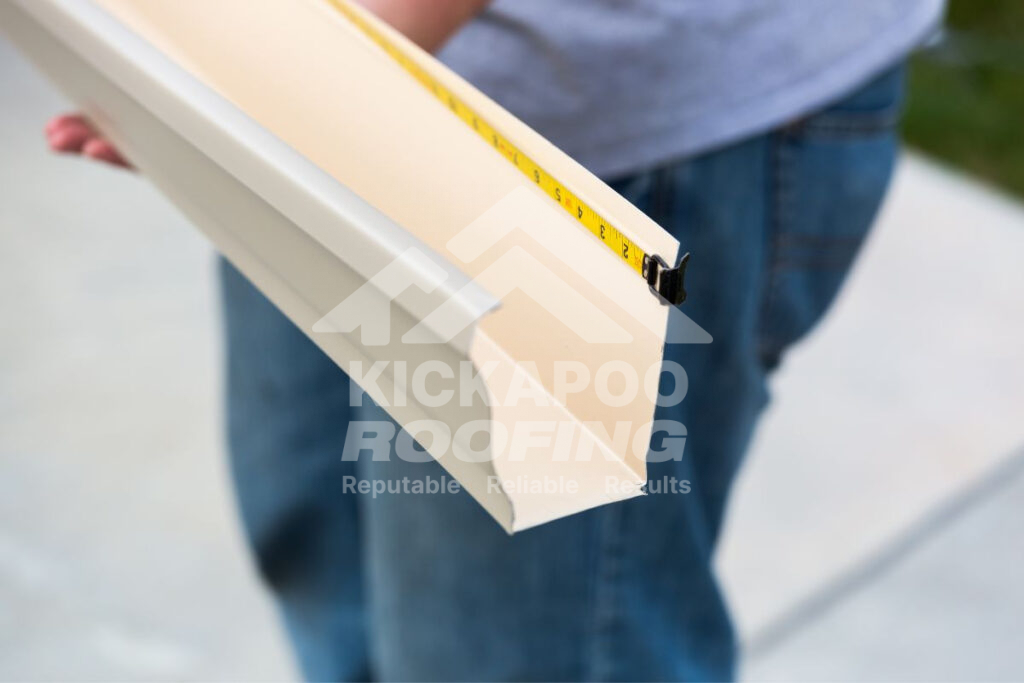
In modern and minimalist homes, K-style gutters are popular for their decorative crown molding appearance, which resembles the letter K. K-style gutters seamlessly blend into any architectural style, offering a great combination of aesthetics and functionality.
They have flat bottoms and backs which allow them to hold more water compared to other styles of similar size. They can function for years when maintained and cleaned regularly.
2. Half-Round Gutters
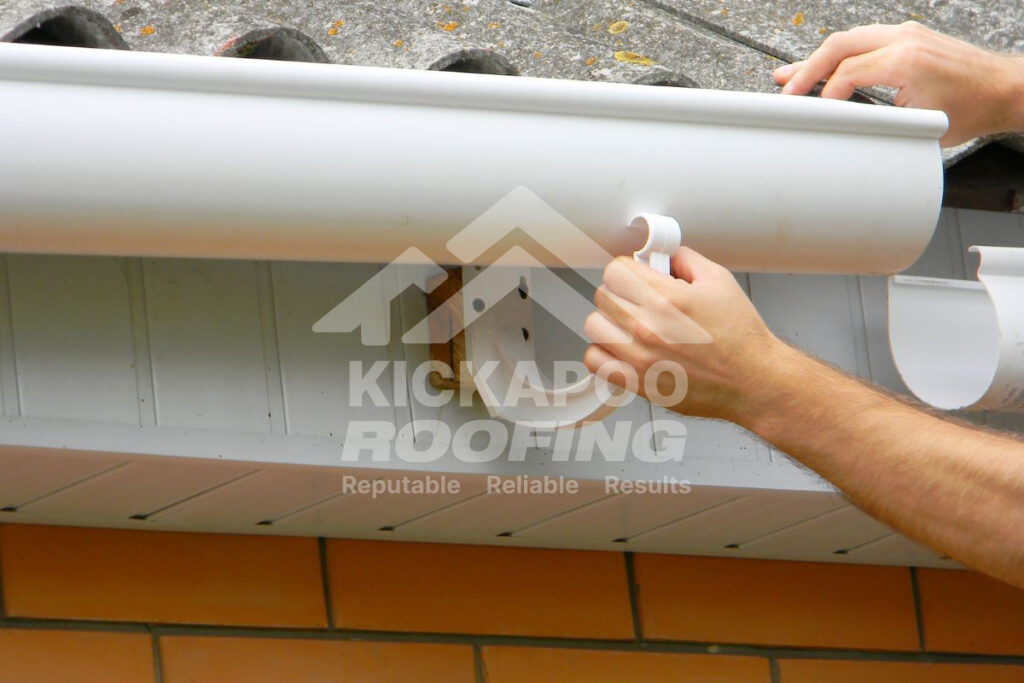
Generally installed on traditional-style and historic homes, half-round gutters take the name of their spherical shape, which can effectively drain the water away from your home.
Seamlessly blending with your roofline, half-round gutters increase the aesthetics of your home and ensure a smooth flow of water. These gutters present fewer instances of corrosion due to minimal standing water accumulation.
3. Box Gutters
Do you live in areas with constant rainfall? Box gutters can be the right choice. Typically broader and deeper than other rain gutter styles, box gutters offer excellent rainwater handling capacity—ideal for regions that experience frequent heavy rainfall.
For their minimalist appeal and an enhanced capacity to handle more drainage, box gutters effectively complement modern structures with sharp lines and corners.
4. Fascia Gutters
Fascia gutters integrate directly into your existing fascia board. Unlike the other styles that are attached onto the fascia board, these gutters replace them entirely. They provide a sleek, modern look while ensuring your roof edges are protected by preventing water seepage.
Later in this blog post, we will discuss other important factors to consider before installing a gutter in your home. Next, let’s examine the different types of gutter materials.
Different Types of Gutter Materials
One of the most vital aspects to consider when installing a gutter system is the material. Each material has characteristics that make it uniquely useful under specific circumstances. Therefore, it’s essential to consider these features before making your choice.
1. Aluminum Gutters
First on our list is aluminum. This gutter material dominates the market due to its affordability and versatility. The lightness of aluminum makes them easy to install – an attractive point for DIY enthusiasts aiming to install gutters themselves.
The other key point behind choosing aluminum is that it doesn’t rust. This is a notable advantage because gutters tend to retain water and debris, leading to corrosion in rust-prone materials over time. However, despite their corrosion-resistance, aluminum gutters are susceptible to denting or bending from harsh weather conditions or fallen branches because of their lightweight nature.
2. Copper Gutters
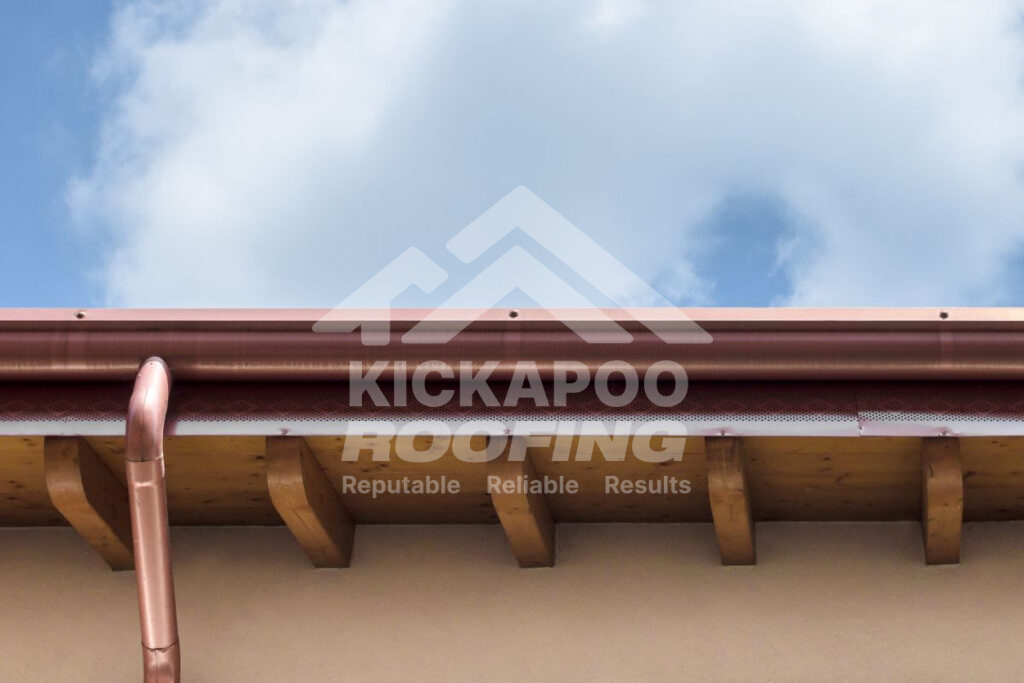
Now, let’s discuss copper gutters – the elegant counterpart known more for aesthetics and practicality. This premium option is lauded for its beauty and durability. When maintained properly, they age exceptionally well compared with other rain gutter materials. Copper won’t rust, doesn’t require painting, and can last up to a hundred years or more.
However, there is one downside. Copper gutters, being high-end products, means you’ll pay significantly more than other materials. And since they are heavier than aluminum or vinyl gutters, professional installation may be necessary, given their complexity.
3. Galvanized Steel Gutters
Among the different materials, galvanized steel gutters come out on top for their durability and life expectancy. Known as one of the toughest gutter materials out there, they can withstand heavy downpours without buckling under the weight of water flow. By treating steel with a layer of zinc, these gutters are rust resistant, which significantly bolsters durability and lifespan.
However, they may eventually succumb to corrosion after a while due to consistent exposure to moisture. Therefore, maintenance and cleaning will be needed periodically to remove rust and corrosion.
4. Vinyl Gutters
Another popular option in the industry is vinyl gutters. Known for their versatility, ease of installation, and affordability, vinyl gutters can effectively channel rain away when installed on your home. Their lightweight nature makes installation simpler for contractors. The other main advantage of vinyl gutters is they do not corrode and rust, unlike their metal countertypes.
But, frigid temperatures don’t go well with vinyl. It tends to become brittle and is likely to crack under such conditions.
Factors to Consider When Choosing the Best Rain Gutter System for Your Home
Before we dive into the details, you need to understand that your selection of rain gutters isn’t a one size fits all situation. Rather, it’s contingent on numerous variables unique to your home and location.
1. Your Local Area Climate and Weather Conditions
Primarily, consider the weather conditions throughout the year in your local area. If you frequently experience torrential downpours or heavy snowfalls, choosing sturdy materials like steel or copper gutters can be beneficial because they stand up better under extreme weather conditions.
2. Architecture and Style of Your House
Each house has its own architectural style, and you want your gutters to complement this aesthetic rather than detract from it. For instance, K-style gutters are ideal if your home is modern, while half-round gutters might suit traditional-style houses better.
3. Roofing Material
Your roofing material also plays a crucial role in determining the type of gutters you choose. The material that makes up your roof also directly impacts which type of gutter system will work best with it.
Some roofing materials may require particular types of gutters due to how they distribute water runoff. Before installing gutters, schedule a professional roof inspection to make sure your choice matches your requirements.
4. Your Budget
The cost of gutter installation is directly affected by the gutter type, style, and material you decide on. For example, vinyl is generally affordable and is a popular choice for homeowners on tighter budgets, whereas copper tends to lean toward the higher end of the cost spectrum.
Final Thoughts
Different types of gutters have varied strengths and weaknesses, each aligning uniquely with your house conditions and preferences. Therefore, understanding these factors is essential to making an informed decision for your home and the years to come.
Contact Professional Gutters Installers In La Crosse, WI
Now that you have explored the different types and styles of gutters, you can make the right decision. Also, it’s important to note that gutter installation is a tedious task that should be best left to professionals. There is no doubt that some gutter styles can be installed DIY, but still, we don’t recommend it.
When you choose Kickapoo Roofing in La Crosse, WI, for your gutter installation, you get:
- A thorough analysis of your roof and drainage system
- Successful gutter installation by skilled gutter installers
- Support of professionals in case of emergency or issues down the line
So, if you want professionals to install your gutters, contact us today at (608) 352-8688. Or if you aren’t sure what type of gutter system is best for your home, you can contact us for a free roof inspection and estimate.
 (608) 352-8688
(608) 352-8688  schedule consultation
schedule consultation
